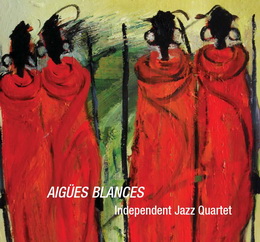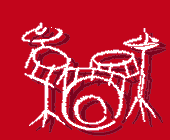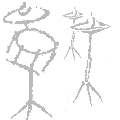 |
 |
 |
 |
| |
 |
home
/ diskographie / Independent Jazz Quartet - Aigües Blances
|
|
|









 
 |
|
Independent Jazz Quartet
"Aigües Blances"
Unisono-Records
2012
|
|
| |
The Independent Jazz Quartet – that first word resonates with the sense of musical independence and freedom – a freedom that these musicians fashion with fantasy and emotional strength.. ... [more]
 Cover: Jutta Römer Cover: Jutta Römer
Jürgen Scheele · tp/flh
Rolf Römer · ts/ss/bcl
Lars Gühlcke · double-bass
Ernst Bier · drums/percussion
| 1. |
Desert Island |
J.Scheele |
|
7:29 |
| 2. |
The Art of Quartet |
J.Scheele |
|
6:01 |
| 3. |
Playground |
R.Römer |
|
8:36 |
| 4. |
Caja Azul |
J.Scheele |
|
6:30 |
| 5. |
Timeless |
J.Scheele |
|
8:05 |
| 6. |
Rachel's Song |
E.Bier |
|
6:30 |
| 7. |
Aigües Blances |
J.Scheele |
|
6:16 |
| 8. |
Ashanti |
J.Scheele |
|
8:40 |
| 9. |
West of Cairo |
R.Römer |
|
6:27 |
| 10. |
The Clan |
J.Scheele |
|
6:12 |
Recorded live at jazzwerkstatt October 21, 2009
Recorded by Patrick Römer - http://www.unisono-studio.de
Mixed and Mastered by Patrick Römer - http://www.unisono-studio.de
Executive Producer: Rolf Römer - http://www.rolf-roemer.de
Photos by Jakob Vorberg
Cover design by Ivana Kersting - http://www.ivadesign.com
Cover painting by Jutta Römer - http://www.juro-art.de
Ernst Bier plays Pommerenke Drums - www.schlagzeugbetreuung.de
Diese CD bestellen bei.........
[order]
Linernotes
Independent Jazz Quartet - Aigües Blances
Here are musicians who participate in a freely coalesced form of play; for them playing contemporary jazz grounded in the jazz tradition belongs to the most beautiful of freedoms. Their music is open to the most contem- porary compositional possibilities, and at the same time it is timeless in the best sense. Four distinct musical personalities complement one
another, and in so doing they create a group sound. Here is music that can bring cool relief to a hot summer day and heat up the cold winter evenings. The imaginary setting for these sounds is the intimacy of a classic jazz club with its close contact between the musicians
and the public.
What makes this music so exciting is its emotional and dynamic tonal spectrum, the devilishly rousing improvisations, and the unity of the musical performance. It reminds one of the classic hard bop bands. At the same time the quartet takes on the feeling of freedom that is so tied together with Ornette Coleman’s music, as it eschews a harmony
instrument such as a piano or guitar. Yet the Independent Jazz Quartet sounds different; it also differs from the music of the revered demigods of modern jazz history, although there is something from the music of a Clifford Brown or Miles Davis, a John Coltrane, Sonny Rollins, or Dexter Gordon that resonates through parts of the Independent Jazz Quartet’s
music. But these are at most trace elements in the play of the four musicians as they glide through the jazz world with open minds, intent on staying true to their own collective musical vision. Here the music is strongly interactive; built on the solid and at the same time flexible foundation of bass and drums, it allows for a multiplicity of tonal colours
through the trumpet (or flugelhorn) combined with bass clarinet, tenor, or soprano saxophone. From time to time the horns burn as if in a battle, a “fight” that ends up in evocative, intensive cooperation.
The original compositions underline the players’ desire to separate themselves from the myriad of imitators. Pieces such as “West of Cairo” reflect an autobiographic perspective - in this case, Rolf Römer’s collected experiences when he spent over a year working in Libya. Orientalism and European influences meld together with the essence of jazz in the quartet’s play. The music completely does without the decorative; instead, the music is direct, gripping, vital.
Trumpeter Jürgen Scheele began his musical career in Berlin in the 70’s, working as a studio musician as well as playing in a wide variety of bands. Since the late 80’s he has been living in Spain where he has worked with the likes of Robin Eubanks, Lew Tabackin, Harold Land, Tete Montoliu and the Manhattan Transfer. He serves as the driving force of the Independent Jazz Quartet. Alongside Scheele is saxophonist Rolf Römer, one of the most experienced musicians on the German jazz scene. In the course of his more than 20-year participation in WDR Big Band in Cologne, he has helped to build the band’s international
standing. Bassist Lars Gühlcke studied in Amsterdam with Ernst Glerum and Misha Mengelberg; he has played with a variety of groups, including Joe Haider, Ed Kröger, Larry Porter, Ted Rosenthal, and Heinrich Köbberling. Drummer Ernst Bier studied with the likes
of Billy Brooks and Elvin Jones and lived and worked in New York from 1982 to 1987. Bier has played with such different musical personalities as Attila Zoller and Ted Curson, and has been a member of Perry Robinson’s band since 1984. His individual and at the same time flexible style has distinguished him as one of the most sought-after drummers in
contemporary jazz.
The Independent Jazz Quartet – that first word resonates with the sense of musical independence and freedom – a freedom that these musicians fashion with fantasy and emotional strength.
Bert Noglik
Translation Marty Cook
|
|
| |
|
|
 top top |
|

Presse:
Mit
"Aigües Blances" hat Rolf Römer beim Label Unisono-Records ein Album
mit Modern World-Jazz herausgebracht, das einfach nur Spaß macht. Das
Independent Jazz Quartet hat den Platz-Vorteil und nutzt ihn zu einer
phantastischen Performance. Das ist Modern Jazz á la bonheur mit dem
gewissen "Touch o´ world", der den Zeitgeist mit der klassischen Form
verbindet und ist ein großer Wurf und eine Empfehlung wert.
Frank Becker - Musenblätter 30.04.2012
Hier haben sich vier Musiker zusammengefunden, die sich
unabhängig und frei in mehrfacher Hinsicht fühlen. Sie sind äußerst
aktiv, aber frei in der Berliner und deutschen Szene unterwegs, auf
einem hohen musikalischen Niveau, das gespeist wird aus der Erfahrung
erfolgreicher Karrieren und zugleich stetiger Aufgeschlossenheit
gegenüber allem Neuen, grundiert auf innerer Souveränität und
künstlerischer Freiheit. So ist in Ulli Blobels Berliner „jazzwerkstatt“
vor Publikum eine bemerkenswerte Live-CD entstanden, die nichts von
steriler Studio-Atmosphäre hat, sondern unmittelbar zum Hörer kommt.
Es
wird – so Bernd Noglik in den Liner Notes – „verteufelt“ improvisiert:
hard boppig, lyrisch zart oder mitreißend free, abwechslungs- und
einfallsreich. Wechselnde Rhythmen und Tempi schaffen enorme Spannung.
Über manchen Stücken schwebt ein mediterranes oder orientalisches Flair,
manche swingen straight on. Die Rollen sind bei glänzend
funktionierender Interaktion gleichwertig auf die vier brillanten
Musiker verteilt. Einen Hinweis verdient auch das ungewöhnlich schöne
Cover mit vier (sic) in leuchtend rote Gewänder gehüllten Massai-Frauen
(Painting Jutta Römer, Design Ivana Kersting) dieser rundum gelungenen
CD. Sie sollte keinesfalls im Meer der Neuerscheinungen untergehen.
Dietrich Schlegel - Jazzzeitung 2012/03
Questo disco testimonia l'attività del quartetto da tempo attivo sulla scena berlinese. L'indipendenza, dichiarata sin dal nome, ha a che fare non solo con l'assenza di strumenti armonici ma anche con un'individualità di stili. Nei dieci brani, quasi tutti di Scheele e Römer, si leggono sin dall'apertura le dichiarazioni di intenti. L'omaggio esplicito nella sonorità e nelle struttu- re è a certe avanguardie storiche del jazz e in particolare a musicisti come Don Cherry e Ornette Coleman. Forse è un fatto generazionale: tuttavia, se la ritmica è disponibile a recidere i legami con il passato, Scheele e soprattutto Römer non riescono a conquistare una reale indipendenza da esso. Il fraseggio di Römer, soprattutto al tenore, ricorda Un negozio di antiquariato jazzistico in cui si riportano in vita frammenti del tempo che fu. La registrazone, di ottimo livello, documenta tuttavia un contemporary jazz che si guarda indietro con insistenza e non aggiunge nulla di nuovo a quanto già molte (troppe) volte sentita.
Crisafi - Musica Jazz / agosto 2013
Eine der größten Auffälligkeiten des Quartetts, dessen Mitglieder
durchweg Routiniers ihres Fach sind, die bis dato in unterschiedlichsten
Formationen ihr Glück suchten, dürfte die Tatsache sein, dass auf Piano und
Gitarre gänzlich verzichtet wurde und so neue kreative Wege gegangen wurden, die
zehn Titel des Albums mit dem für Laien etwas schwierigen Titel “Aigües Blances“ (katalanisch für “weiße Wasser“) zu bebildern.
Die selbstkomponierten Stücke, die durchweg als Live-Take eingespielt wurden,
glänzen neben den zu erwartenden Anteilen an zeitgenössischem Jazz und Kanthaken
aus Bebop mit folkloristischen Ausflügen, die, der Albumtitel lässt grüssen,
auch spanischer sowie nordafrikanischer Herkunft sind. Freie Improvisation
dürfte immer wieder das Stichwort des sehr lebendig aufspielenden Independent
Jazz Quartets gewesen sein, was dem Album eine ganz eigene Stimmung gibt, die
zumindest in den Spitzen dann auch mal mit Struktur, Nachvollziehbarkeit und
Bodenhaftung punkten kann. “Aigües Blances“ ist
sicher kein oberflächliches Standard-Jazz-Werk, das sich als Hintergrundmusik
beim gemütlichen Abend am Kamin eignet. Wer aber ein konzeptionell fesselndes,
forderndes Album mit interpretatorischem Überraschungsfaktor und
folkloristischen Winkelzügen zu schätzen weiß, wird hier ohne wenn und aber voll
auf seine Kosten kommen.
© Holger S. Jansen @ www.soultrainonline.de
|




